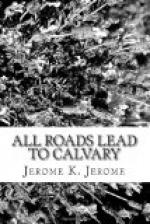“I so want them to listen to me,” she said. “After all, it’s only like having a very loud voice.”
He looked at her and smiled. “Yes,” he said, “it’s a voice men will listen to.”
Mary Greyson was standing by the fire. She had not spoken hitherto.
“You won’t give up ’Clorinda’?” she asked.
Joan had intended to do so, but something in Mary’s voice caused her, against her will, to change her mind.
“Of course not,” she answered. “I shall run them both. It will be like writing Jekyll and Hyde.”
“What will you sign yourself?” he asked.
“My own name, I think,” she said. “Joan Allway.”
Miss Greyson suggested her coming home to dinner with them; but Joan found an excuse. She wanted to be alone.
CHAPTER V
The twilight was fading as she left the office. She turned northward, choosing a broad, ill-lighted road. It did not matter which way she took. She wanted to think; or, rather, to dream.
It would all fall out as she had intended. She would commence by becoming a power in journalism. She was reconciled now to the photograph idea—was even keen on it herself. She would be taken full face so that she would be looking straight into the eyes of her readers as she talked to them. It would compel her to be herself; just a hopeful, loving woman: a little better educated than the majority, having had greater opportunity: a little further seeing, maybe, having had more leisure for thought: but otherwise, no whit superior to any other young, eager woman of the people. This absurd journalistic pose of omniscience, of infallibility—this non-existent garment of supreme wisdom that, like the King’s clothes in the fairy story, was donned to hide his nakedness by every strutting nonentity of Fleet Street! She would have no use for it. It should be a friend, a comrade, a fellow-servant of the great Master, taking counsel with them, asking their help. Government by the people for the people! It must be made real. These silent, thoughtful-looking workers, hurrying homewards through the darkening streets; these patient, shrewd-planning housewives casting their shadows on the drawn-down blinds: it was they who should be shaping the world, not the journalists to whom all life was but so much “copy.” This monstrous conspiracy, once of the Sword, of the Church, now of the Press, that put all Government into the hands of a few stuffy old gentlemen, politicians, leader writers, without sympathy or understanding: it was time that it was swept away. She would raise a new standard. It should be, not “Listen to me, oh ye dumb,” but, “Speak to me. Tell me your hidden hopes, your fears, your dreams. Tell me your experience, your thoughts born of knowledge, of suffering.”




